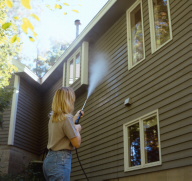|
|
Buying Guide
An average garden hose allows water to flow at a rate of 5 - 10 GPM (gallon per minute) at a pressure of 30 - 50 PSI (pounds per square inch). A light duty residential pressure washer uses 1.6 GPM at a pressure of 1750 PSI. This gives the pressure washer between 5 - 18 times more cleaning power, using 68% less water. Common uses for a residential pressure washer are cleaning your wooden deck, washing your car, cleaning your driveway/sidewalks, or cleaning your house siding/windows. Garden hoses do not generate the power necessary to clean effectively. A pressure washer makes cleaning a variety of areas around the house faster and easier and using a pressure washer is often the best method for cleaning hard to reach areas. How does a Powermate pressure washer work? When using a pressure washer you are breaking the bond between two things, the surface you are cleaning and the dirt/contaminates you are trying to remove. There are three primary components that make a pressure washer work:
All three are important and affect your purchasing decision. As you review the types of pressure washers and the power considerations in the sections below you will see how these components interact. What Types of Pressure Washers are there?
Which Powermate pressure washer one is right for you will depend on where you plan to use it and what tasks you plan on doing. How much power do I need? The amount of power you need depends on the job. A light duty pressure washer (1,400 - 2,200 PSI) has approximately 30 times more power than a garden hose. Heavy duty pressure washers (2,600 - 4,000 PSI) can be used for stripping paint and cleaning large areas.
What Features and Accessories do I need? Most pressure washer come with a standard hose and wand. Additional accessories like a rotating car washing brush, chemical injection tip, extended wands, chemical solutions for specific cleaning tasks and additional tips may also be available depending on the model you purchased. FAQ's Can I use water from a lake or holding tank? No. The pump is designed to operate at specific gallons per minuteof input pressure. If that minimum amount of water is not supplied to the pump, the pump can be damaged. Also, water that is drawn from a lake or holding tank may contain debris that could damage the pump. Can I use hot water with my pressure washer? No. Hot water can cause damage to the o-rings and pump. How far should I stand from where I'm cleaning? Start 3-4 feet away and slowly move closer. This will give you the ability to judge which distance is appropriate for the job at hand. Always wear protective eyewear and boots as splashback can occur. Boots protect your feet as water at high pressure can cut skin very easily. Pressure washers are serious tools that should only be used by responsible adults. Read the owner's manual and obey all warnings and instructions. How long can the hoses be extended? The maximum recommended length is 100 feet. The unit will operate at lengths beyond this, but performance will suffer and the chemical injection process may not operate satisfactorily. What are Cleaning Units? As you compare pressure washers you may see something called "cleaning units". Cleaning units are a measure of power that is the results of multiplying the pressure washers' rated PSI X GPM. Some people use the cleaning units to determine what size pressure washer they will need. Example: A light duty pressure washer rated at 1,750 PSI and 1.6 GPM would equal 2,800 Cleaning Unit (CU) rating, compared to a garden hose with 30 PSI and 5 GPM would equal 150 Cleaning Unit (CU) rating. Lifestyle Images 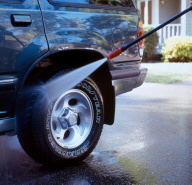
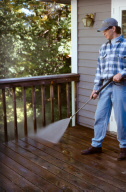
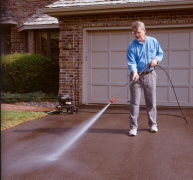
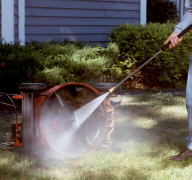
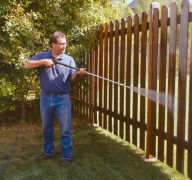
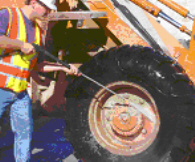
|
Service/Support | Manuals | FAQ | Service Center Locator | Videos | Privacy Policy
Copyright © 2026 MAT Industries LLC. All rights reserved.

